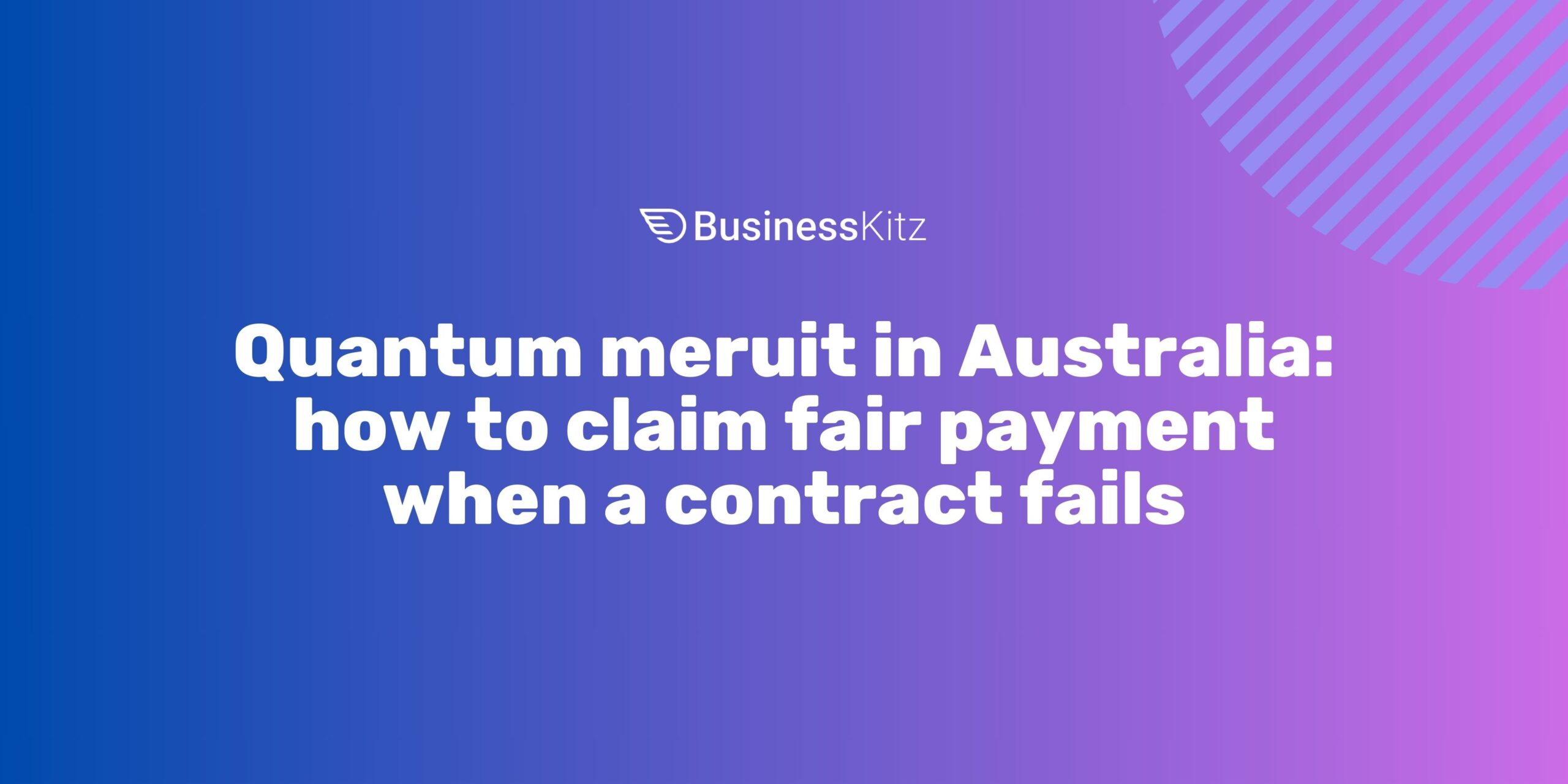
We've helped businesses save $55m with our all-in-one platform. Get instant access to this template and 115+ others, plus AI-powered document creation, starting completely free.
Getting paid for work should be simple. But when there’s no clear contract or when extra work falls outside the scope of the agreement, payment disputes can arise. That’s where quantum meruit comes in. It gives a legal path to claim fair pay when no formal contract covers the work. Whether you're a freelancer, contractor or business owner, knowing your rights can help you avoid unpaid work and resolve disputes with confidence.[ez-toc]
Quantum meruit means “what one has earned.” It lets a person claim fair payment for work done when no valid contract exists. It applies if a job goes beyond the agreed scope, ends early or starts without a signed deal. This legal rule helps stop one party from unfairly gaining without paying for services received.
Quantum meruit is a legal concept that means “what one has earned.” It allows someone to be paid for work or services even if there is no valid contract in place. In simple terms, it’s about getting paid fairly for what you’ve done.This principle becomes important when a contract is missing, unclear, or no longer enforceable. For example, if you do extra work not included in the original agreement, or if the other party ends the contract early, you may still have the right to be paid. This type of claim is called a quantum meruit claim.Quantum meruit helps protect people and businesses from doing work for free when someone else benefits. It stops one party from being unjustly enriched at the expense of another. It is often used when there is no agreement on a final contract price, but work has already been completed.This type of claim often comes up in:
Whether you're a freelancer, small business, or work in the construction industry, understanding quantum meruit can help ensure you’re fairly paid.

Quantum meruit applies when one party provides work or services but cannot rely on a valid contract for payment. This may happen for many reasons. In these cases, the law steps in to make sure the person who did the work still gets paid fairly.
A claim in quantum meruit can arise in the following situations:
When any of these apply, the party who did the work may have a quantum meruit claim to recover a reasonable sum.
FeatureQuantum meruitContractual paymentBased onValue of the work or services providedPre-agreed contract priceWhen usedNo valid agreementA valid contract existsCourt focuses onFair market valueTerms of the contractRequires formal contractNoYesIncludes extras and changesSometimesOnly if included in original contract
Quantum meruit helps prevent unjust enrichment. It ensures that one party cannot benefit from the work performed by another without paying for it. The law says it is unfair to enjoy a service and refuse payment just because no formal contract was signed.
A freelance web designer agrees to build a website. The client never signs the contract. The designer builds the site anyway and the client uses it. When the client refuses to pay, the designer can make a claim for quantum meruit. The court may decide the designer is owed a reasonable sum for the value of the services rendered.Quantum meruit helps uphold fairness when contracts fall short.
To succeed in a quantum meruit claim, the person making the claim must meet certain conditions. Courts look at what happened, what was agreed on, and how much value was given.
A claimant can bring a claim in quantum meruit when:
This applies in many situations. For example, if a client ends a contract early, or if the contractual terms are unclear, a claimant may still have a right to payment.
Use this quick checklist to decide if a quantum meruit claim might apply:
If you tick all these, you may be able to claim a reasonable sum.
Courts look at:
The goal is to make sure the other party is not unjustly enriched.
In Pavey & Matthews Pty Ltd v Paul (1987), the High Court of Australia allowed a builder to recover payment. The builder completed work based on an oral agreement. However, the contract was not valid due to statutory requirements. The court found the client had been unjustly enriched, so the builder had a right to a fair payment under quantum meruit.This case shows how Australian law uses quantum meruit to provide a fair remedy when formal contracts fail.
Breach of contract and quantum meruit are not the same. Each one deals with payment disputes, but they apply under different conditions. It is important to know the difference before making a claim or taking legal steps.
A breach of contract happens when one party fails to follow the terms of a valid contract. This could include not paying, not finishing work, or doing something that breaks the agreement. If a contract exists, a court will look at the contractual terms to decide what the claimant is owed.A quantum meruit claim, on the other hand, applies when there is no enforceable contract. The person doing the work can still ask for a reasonable sum if the other party accepted the work or benefit.Here is a simple breakdown:FeatureBreach of contractQuantum meruitContract required?YesNoPayment based onTerms of the contractValue of the services renderedWhen it appliesContract is broken by one partyNo valid contract or unenforceableLegal focusLoss or damage caused by the breachFair pay for the work performedOutcomeAgreed sum or contract price enforcedReasonable payment decided by court
In a breach of contract case, the court may order the other party to pay the debt, cover losses or fix the issue. The claimant must show that a contract existed, it was broken and they suffered damage.In a claim for quantum meruit, the goal is restitution. This means stopping one party from being unjustly enriched at the expense of another. Quantum meruit is rooted in the principle of fairness and balance.Understanding the legal path that fits your situation can help you prevent wasted time, effort and money. When in doubt, seek legal advice from a trusted legal professional.

Quantum meruit is recognised under Australian law as a way to claim fair payment when a formal contract does not apply. It is based on the idea that no party should be unjustly enriched at the expense of another. This remedy helps people and businesses recover the value of services provided or work performed when there is no clear contractual right to payment.
In Australia, quantum meruit claims are common in courts. The law allows a claimant to seek a reasonable sum for work or services if:
Courts look at fairness, not fixed prices. They assess the value of the work, market rates, and how much the other party gained.
While the core principle is the same across states, each one may follow different rules. Some state-based construction laws affect how and when a quantum meruit claim can be made.Key regulators and bodies include:
In some countries, like the UK, courts may apply stricter views on quantum meruit. Other places may limit it to cases of full repudiation or termination. In Australia, courts give more room to use quantum meruit to prevent unfair outcomes.
To avoid disputes, it’s vital to understand local law. What works in one state may not apply in another. Always check the rules where you do business. Using clear written agreements can help you prevent problems and reduce risk. When in doubt, get trusted legal advice.Utilise Business Kitz to securely store key contracts and manage essential documentation. Get access to over 100 document and agreement templates, create and sign contracts, manage employee and contractor agreements and much more! Sign up for free today.
Quantum meruit often appears in the construction industry. This is because many jobs change during the build, and not all changes are documented. When this happens, a builder or contractor may still be owed money, even if the contract doesn’t cover the extra work.
Construction jobs involve many moving parts, and things change quickly. When those changes are not recorded in writing, disputes can follow. A quantum meruit claim helps one party get paid when the work falls outside the original contract scope.Some common triggers include:
A builder is hired to construct a two-bedroom unit. Midway, the client asks for a third room. The builder agrees and finishes the extra work. The client refuses to pay, claiming the contract price was fixed. With no signed variation, the builder cannot claim under the contract. A claim in quantum meruit becomes the only way to recover costs.
To reduce disputes, always:
Good paperwork helps you enforce your rights and avoid needing a quantum meruit remedy in the first place. Securely store your contracts in Business Kitz Document vault to ensure you never lose your important documentation. Access your contracts from any device at any time simply by signing in to your account, and send and sign documents at the click of a button. Get started today!
Many quantum meruit claims come from poor paperwork. If changes are not written down or agreed in writing, the risk of a dispute goes up. The best way to avoid problems is to plan ahead and use good systems.
These simple actions help parties stay clear of conflict:
Michael owns a busy physio clinic. He hires a builder to renovate the space. They agree to a two-room layout. Later, Michael asks for a third treatment room but doesn’t update the contract. The builder completes the extra work. When Michael refuses to pay the extra cost, the builder can no longer rely on the original agreement. With no updated contract price, the builder must file a claim in quantum meruit to get paid.
If a contract falls through or the other party refuses to pay, you may need to make a claim in quantum meruit. This type of claim lets you ask for a reasonable sum for services provided or work performed. You need to follow the right steps and support your claim with strong evidence.
It is best to speak with a lawyer regarding making a quantum meruit claim. You can take the following steps to get a head start:
A claim for quantum meruit should always be your backup, not your first option. Good records and fair dealing often stop disputes before they grow.

Not every quantum meruit issue needs a lawyer, but some clearly do. If you are facing a large or complex dispute, speaking with a legal expert early can save time, money and stress. Legal advice helps you understand your rights and the strength of your claimant position.
Call a lawyer when you deal with:
A lawyer will:
Having the right systems in place can help you minimise business risks. Business Kitz enables you to:
Good systems help reduce mistakes, improve the protection of both parties, and clarify obligations. This lowers the risk of repudiation, termination, or disputes down the track. When your paperwork is strong, you often prevent issues before they start. Sign up for a free Business Kitz trial today!
Quantum meruit focuses on fair payment when no clear contract exists. However, the idea of consideration and intention still plays a big part. These two terms help a court decide whether someone should pay for the work performed.
In quantum meruit cases, these ideas help judges work out if payment is fair and expected. Even if there is no signed contract, a party may still be entitled to a reasonable sum if the other side clearly accepted the work.
A graphic designer sends a client a mock-up for a brand project. The client says they like it and asks for edits. The designer delivers the final files. Later, the client refuses to pay, saying there was no agreed sum or signed contract.Here, the court may find that the client accepted the services provided, showed intent to use the work and gave clear feedback. These facts support a quantum meruit claim, as they show intention and consideration in action.
Quantum meruit has become more important in today’s work world. Many jobs now rely on fast, flexible deals. Freelancers, small businesses and service providers often start work before a full contract is signed. This can lead to confusion, disputes or unpaid work if things go wrong.
Work styles have changed. So have the risks.
To prevent problems:
In a fast-paced business world, quantum meruit remains a key principle for fair pay. But ensuring you have good systems in place mean you may never need to use it.
Understanding quantum meruit claims means knowing when you can ask for payment without a valid contract. You must show that work was done, the other party accepted it and that payment was expected. It helps make sure you receive fair compensation for the value delivered, even when no formal contract exists.
You can make a claim when there is no valid contract or when the contract is unclear or unenforceable. This includes cases where extra work was done, the job ended early or the original agreement broke down. The circumstance must show that the other party accepted the benefit of the work.
A strong case includes proof of the work done, proof that the other party accepted it, evidence that you expected to be paid, and evidence that you were not compensated. It helps if you can show time spent, cost of labour and market value. Clear records make your case stronger.
Yes. If you completed work under a verbal deal and the other party accepted it, you may still have a claim. It’s crucial to show intent to pay and that the work had real value. Seek legal advice to get a better understanding of whether your case has grounds for quantum meruit.
Yes. A written contract is still the best protection. Quantum meruit is a backup if the contract fails or doesn't cover everything. Relying on it should not be your first plan.
In simple cases, you may not need legal help. But if the circumstance involves a large amount or complex work, it’s crucial to get legal advice. This can help you prepare your claim and avoid court. For best results, it is generally recommended to get legal assistance in any instance where you intend to make a claim and engage the legal system.
Quantum meruit lets you claim fair payment when no valid contract covers the work. It applies when jobs fall outside the agreed scope, when deals are verbal or when a contract ends early. It helps stop one party from being unjustly enriched at the expense of another.But it should not be your first plan. It’s a safety net—not a solution to poor paperwork. Clear agreements and strong records are always better.To protect your business:
Business Kitz makes this easy. With ready-to-use contract templates and digital storage, you can stay organised and reduce risk. Sign up for free!Disclaimer: This content is intended to be used for educational and informational purposes only. Business Kitz does not offer legal advice and cannot guarantee the accuracy, reliability, or suitability of its website content for a particular purpose. We encourage you to seek professional advice from a licensed professional and verify statements before relying on them. We are not responsible for any legal actions or decisions made based on the information provided on our website.Unless expressly stated otherwise, all content, materials, text, images, videos and other media on this website and its contents are the property of their respective copyright owners.
Copyright © 2025 Business Kitz 14312161